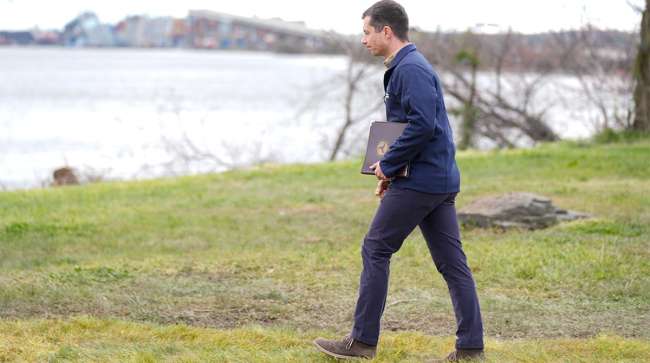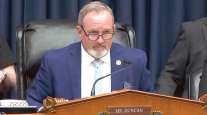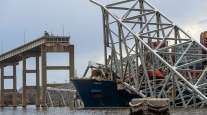Senior Reporter
Buttigieg Announces Infrastructure Funds

[Stay on top of transportation news: Get TTNews in your inbox.]
Assuring the country about the Biden administration’s efforts to improve connectivity along mobility corridors is atop Secretary Pete Buttigieg’s spring agenda.
This month, the nation’s top transportation officer announced funding and strategies aimed at helping the Port of Baltimore rebuild after the collapse of a bridge. DOT also announced grants for reconnecting disenfranchised communities and promoted weather resilience projects that respond to climate change.
The department’s attention to nationwide concerns and crises is made possible partly via 2021’s Infrastructure Investment and Jobs Act, Buttigieg affirmed. The $1.2 trillion bipartisan infrastructure law approved billions of dollars for advancing supply chain programs as well as expanding emergency response accounts.
“President [Joe] Biden’s infrastructure law has created a once-in-a-generation opportunity through which communities are reimagining and delivering safe, reliable transportation,” Buttigieg said April 15 to mark the announcement of nearly $25 million for projects aimed at assisting under-resourced and disadvantaged communities. The funding is part of the thriving communities program. “Our department is proud to help another 112 under-resourced communities with hands-on assistance to secure federal infrastructure funding and then deliver those projects well.”
We're investing $846 million in projects that directly support our resilience in our transportation systems from impacts from climate change, like sea-level rise and extreme weather. https://t.co/ByVNVzJ03g — U.S. Department of Transportation (@USDOT) April 23, 2024
Before the reconnecting communities announcement, DOT awarded $830 million as part of its Promoting Resilient Operations for Transformative, Efficient and Cost-saving Transportation, or PROTECT, grants. The funding is designed to help state, regional and tribal agencies advance resilience projects in order to withstand the impacts of extreme weather events.
“From wildfires shutting down freight rail lines in California to mudslides closing down a highway in Colorado, from a drought causing the halt of barge traffic on the Mississippi River to subways being flooded in New York,” observed the secretary, “extreme weather, made worse by climate change, is damaging America’s transportation infrastructure, cutting people off from getting to where they need to go, and threatening to raise the cost of goods by disrupting supply chains.”
Specific to the response at the Port of Baltimore, DOT officials on April 19 said they met with the White House’s National Economic Council and leaders from East Coast ports. The meeting sought to continue efforts to mitigate supply chain disruptions in the aftermath of last month’s collapse of the Francis Scott Key Bridge.
At the meeting, “East Coast port leaders explained how operations at their ports have been impacted by increased throughput from vessels that otherwise would have gone through Baltimore. Those ports have so far been able to accommodate the increase in container, breakbulk, dry bulk and [roll-on/roll-off] traffic and have worked to make sure Maryland-based truck drivers can access their facilities,” according to information DOT provided. For weeks, stakeholders have enhanced interoperability to ameliorate and rehabilitate traffic and supply chain connectivity. DOT officials signaled the Army Corps of Engineers intends to deliver full access to the site’s waterways by the end of May.
Days after the collapse, the secretary indicated: “President Biden has been clear: The federal government will do everything it takes to help rebuild the bridge and get the Port of Baltimore back open.”
Want more news? Listen to today's daily briefing above or go here for more info
Meanwhile, senior Maryland officials are urging federal lawmakers to approve emergency aid to pay for the rebuilding operation. The bipartisan, bicameral Baltimore BRIDGE Relief Act, sponsored by Maryland’s congressional delegation, would require the federal government to cover the full cost of replacing the bridge. The Federal Highway Administration provided Maryland $60 million from its emergency account.
On March 26, the containership MV Dali struck the bridge, resulting in its collapse and the deaths of six road workers. The National Transportation Safety Board is conducting an investigation.




